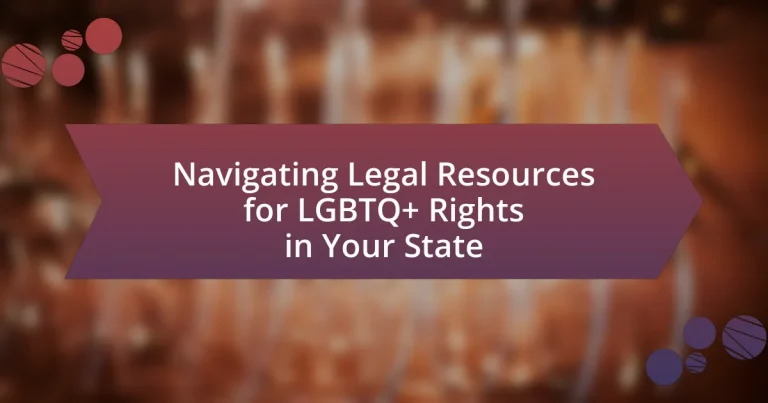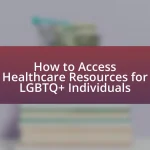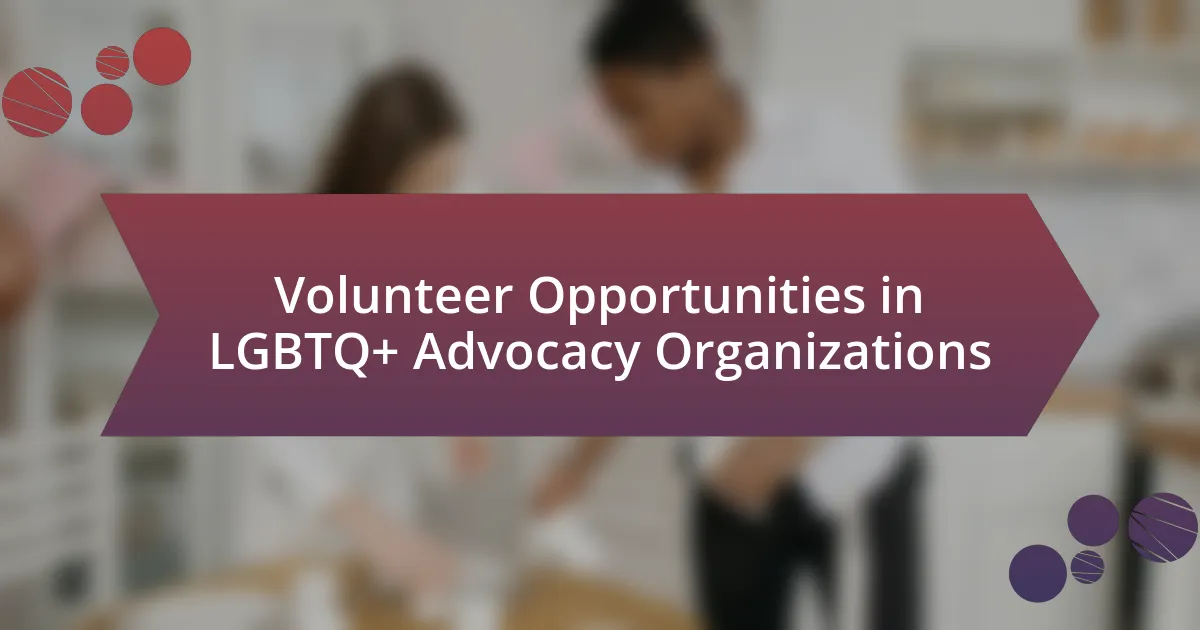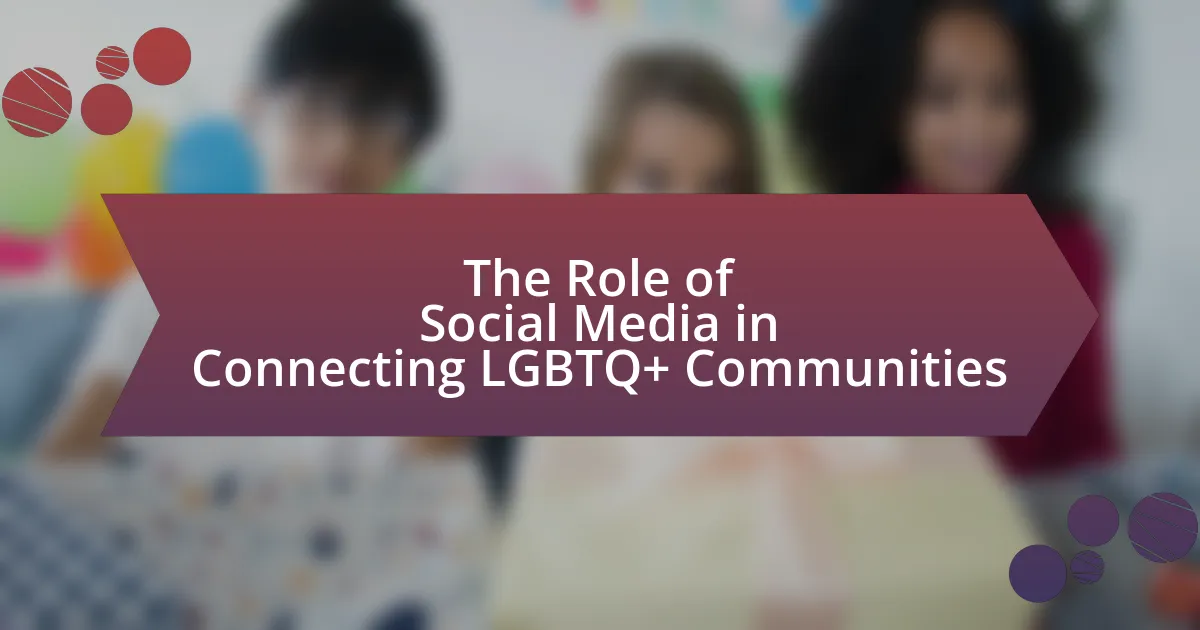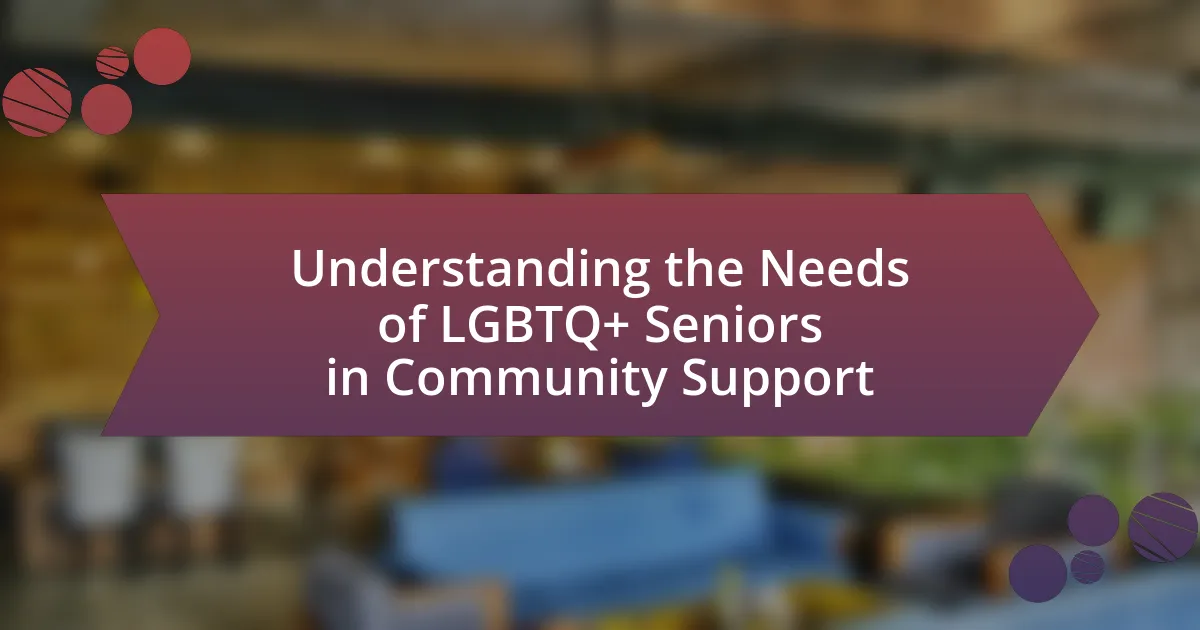The article focuses on navigating legal resources for LGBTQ+ rights within individual states, highlighting key legal resources such as local advocacy organizations, state human rights commissions, and specialized legal aid services. It outlines how to identify LGBTQ+ rights organizations, the types of services they provide, and the legal protections available for LGBTQ+ individuals, including anti-discrimination laws and marriage equality. Additionally, the article discusses the process for seeking legal assistance, documenting discrimination, and engaging with lawmakers to advocate for LGBTQ+ rights, while emphasizing the importance of understanding both state and federal legal frameworks.

What are the key legal resources for LGBTQ+ rights in your state?
The key legal resources for LGBTQ+ rights in your state include local LGBTQ+ advocacy organizations, state human rights commissions, and legal aid services specializing in LGBTQ+ issues. For example, organizations such as the Human Rights Campaign and Lambda Legal provide legal support and resources tailored to LGBTQ+ individuals. Additionally, state human rights commissions often have specific divisions addressing discrimination based on sexual orientation and gender identity, ensuring enforcement of relevant laws. Legal aid services may offer free or low-cost legal assistance to those facing discrimination or legal challenges related to their LGBTQ+ status.
How can you identify LGBTQ+ rights organizations in your state?
To identify LGBTQ+ rights organizations in your state, start by searching online directories such as the Human Rights Campaign’s website, which lists local organizations by state. Additionally, state-specific LGBTQ+ advocacy groups often have websites or social media pages that provide resources and contact information. Researching local community centers or universities can also yield information on LGBTQ+ organizations, as they frequently host or collaborate with such groups. According to the National LGBTQ Task Force, there are over 1,500 LGBTQ+ organizations across the United States, making it likely that your state has multiple resources available.
What types of services do these organizations provide?
Organizations focused on LGBTQ+ rights provide a range of services including legal assistance, advocacy, education, and support resources. Legal assistance often involves helping individuals navigate discrimination cases, family law issues, and name or gender marker changes. Advocacy services work to influence policy changes and promote awareness of LGBTQ+ rights at local, state, and national levels. Educational programs aim to inform the community about legal rights and available resources, while support resources may include counseling, hotlines, and community-building activities. These services are essential for empowering LGBTQ+ individuals and ensuring their rights are protected.
How can you contact these organizations for assistance?
To contact organizations for assistance regarding LGBTQ+ rights, individuals can typically reach out through their official websites, where contact information such as phone numbers, email addresses, and online chat options are provided. For example, the Human Rights Campaign offers a dedicated support line and resources on their website, allowing users to connect directly for assistance. Additionally, local LGBTQ+ centers often have contact details listed online, enabling individuals to seek help tailored to their specific state or region.
What legal protections exist for LGBTQ+ individuals in your state?
Legal protections for LGBTQ+ individuals in your state include anti-discrimination laws, marriage equality, and adoption rights. Many states have enacted laws that prohibit discrimination based on sexual orientation and gender identity in employment, housing, and public accommodations. For example, the U.S. Supreme Court’s decision in Bostock v. Clayton County (2020) affirmed that Title VII of the Civil Rights Act protects employees from discrimination based on sexual orientation and gender identity. Additionally, same-sex marriage has been legal nationwide since the Obergefell v. Hodges ruling in 2015, granting LGBTQ+ couples the same legal rights as heterosexual couples. Adoption rights vary by state, but many states allow same-sex couples to adopt children on equal terms with opposite-sex couples.
What laws specifically protect against discrimination based on sexual orientation and gender identity?
The primary laws that protect against discrimination based on sexual orientation and gender identity include the Civil Rights Act of 1964, specifically Title VII, which prohibits employment discrimination based on sex, and has been interpreted by the U.S. Supreme Court to include sexual orientation and gender identity. Additionally, the Fair Housing Act prohibits discrimination in housing based on sex, which also encompasses sexual orientation and gender identity. Many states and local jurisdictions have enacted their own laws that provide further protections, such as the Equality Act, which aims to amend the Civil Rights Act to explicitly include sexual orientation and gender identity as protected categories. These laws collectively establish a legal framework to combat discrimination against LGBTQ+ individuals in various areas, including employment, housing, and public accommodations.
How do state laws compare to federal protections for LGBTQ+ rights?
State laws regarding LGBTQ+ rights often vary significantly from federal protections, with some states offering broader rights and protections while others may have more restrictive measures. For instance, federal law, particularly through the Supreme Court’s decision in Bostock v. Clayton County (2020), prohibits employment discrimination based on sexual orientation and gender identity. However, many states have not enacted comprehensive anti-discrimination laws, leading to disparities in protections. In states like California and New York, laws provide extensive protections against discrimination in housing, employment, and public accommodations, while states such as Texas and Florida have enacted laws that limit the rights of LGBTQ+ individuals, particularly concerning transgender rights. This inconsistency highlights the importance of understanding both state and federal legal frameworks when navigating LGBTQ+ rights.
What resources are available for legal assistance and advocacy?
Legal assistance and advocacy resources for LGBTQ+ rights include organizations such as the Lambda Legal Defense and Education Fund, the Human Rights Campaign, and the ACLU, which provide legal support, advocacy, and education on LGBTQ+ issues. These organizations offer services like legal representation, information on rights, and resources for navigating legal challenges specific to LGBTQ+ individuals. For example, Lambda Legal has successfully litigated numerous cases that have advanced LGBTQ+ rights, demonstrating their effectiveness in providing legal assistance.
How can you find pro bono legal services for LGBTQ+ issues?
To find pro bono legal services for LGBTQ+ issues, individuals can start by contacting organizations such as the Lambda Legal Defense and Education Fund, which provides legal assistance and referrals specifically for LGBTQ+ rights. Additionally, local bar associations often have pro bono programs that can connect individuals with attorneys willing to offer free legal services. According to the American Bar Association, many law schools also have legal clinics that focus on LGBTQ+ issues, providing another avenue for obtaining pro bono assistance.
What role do legal aid organizations play in supporting LGBTQ+ rights?
Legal aid organizations play a crucial role in supporting LGBTQ+ rights by providing essential legal services, advocacy, and education to individuals facing discrimination or legal challenges. These organizations often assist with issues such as housing discrimination, employment rights, and family law matters, ensuring that LGBTQ+ individuals have access to the legal protections afforded to them under the law. For instance, the National LGBTQ Task Force reports that legal aid organizations have successfully represented clients in cases involving wrongful termination based on sexual orientation or gender identity, highlighting their impact in combating systemic discrimination.

How can you navigate the legal system for LGBTQ+ rights?
To navigate the legal system for LGBTQ+ rights, individuals should first familiarize themselves with local, state, and federal laws that protect LGBTQ+ individuals from discrimination. Understanding the specific legal protections available, such as the Equality Act, which aims to prohibit discrimination based on sexual orientation and gender identity, is crucial. Additionally, seeking assistance from LGBTQ+ advocacy organizations, such as the Human Rights Campaign or Lambda Legal, can provide valuable resources, legal advice, and support. These organizations often have legal hotlines and can connect individuals with attorneys who specialize in LGBTQ+ rights, ensuring that they receive informed guidance tailored to their specific circumstances.
What steps should you take if you experience discrimination?
If you experience discrimination, the first step is to document the incident thoroughly, including dates, times, locations, and any witnesses. This documentation serves as crucial evidence if you decide to take further action. Next, report the discrimination to the appropriate authority, such as your employer’s HR department, a school administrator, or a relevant government agency, depending on the context of the discrimination. It is also advisable to seek legal advice from organizations specializing in LGBTQ+ rights, such as the Human Rights Campaign or Lambda Legal, which can provide guidance on your rights and potential legal recourse. Additionally, consider reaching out to support groups or advocacy organizations that can offer emotional support and resources. These steps are essential for addressing discrimination effectively and ensuring your rights are protected.
How do you document incidents of discrimination effectively?
To document incidents of discrimination effectively, individuals should record specific details such as the date, time, and location of the incident, as well as the names of those involved and any witnesses present. This method ensures that all relevant information is captured, which is crucial for any potential legal action or reporting to authorities. Additionally, individuals should gather any physical evidence, such as photographs or written communications, that supports their account. Research indicates that detailed documentation increases the likelihood of a successful resolution in discrimination cases, as it provides a clear and factual basis for claims.
What are the procedures for filing a complaint or lawsuit?
To file a complaint or lawsuit, an individual must first determine the appropriate court or agency that has jurisdiction over the issue. This involves researching local laws and regulations relevant to the complaint, particularly those that pertain to LGBTQ+ rights. Next, the individual should gather all necessary documentation and evidence to support their claim, which may include contracts, correspondence, or witness statements.
After preparing the documentation, the individual must complete the required forms for the complaint or lawsuit, ensuring that all information is accurate and complete. These forms typically include a statement of the claim, the relief sought, and any relevant legal grounds for the action. Once the forms are filled out, they must be filed with the appropriate court or agency, often accompanied by a filing fee.
Following the filing, the individual may need to serve the complaint to the opposing party, which involves delivering a copy of the filed documents to them, ensuring they are formally notified of the legal action. The process may also include attending hearings or mediation sessions, depending on the nature of the complaint and the court’s requirements.
These procedures are essential for ensuring that the complaint or lawsuit is properly initiated and can proceed through the legal system.
What are the common legal challenges faced by LGBTQ+ individuals?
LGBTQ+ individuals commonly face legal challenges such as discrimination in employment, housing, and public accommodations. These challenges arise from a lack of comprehensive anti-discrimination laws in many jurisdictions, which can lead to unequal treatment based on sexual orientation or gender identity. For instance, a 2020 report by the Human Rights Campaign indicated that 46% of LGBTQ+ workers experienced discrimination in the workplace. Additionally, issues related to family law, such as child custody and adoption rights, often present significant hurdles due to varying state laws. Furthermore, transgender individuals frequently encounter barriers in accessing healthcare and legal recognition of their gender identity, as highlighted by the National Center for Transgender Equality’s 2015 U.S. Transgender Survey, which found that 33% of respondents reported being denied healthcare due to their gender identity. These legal challenges underscore the ongoing need for advocacy and reform to ensure equal rights for LGBTQ+ individuals.
How can you prepare for potential legal battles regarding LGBTQ+ rights?
To prepare for potential legal battles regarding LGBTQ+ rights, individuals and organizations should gather comprehensive legal resources and establish connections with advocacy groups. This preparation includes researching local, state, and federal laws that protect LGBTQ+ rights, as well as understanding the legal precedents that may influence future cases. For instance, the landmark Supreme Court case Obergefell v. Hodges (2015) established the constitutional right to same-sex marriage, which serves as a critical reference point in legal discussions. Additionally, connecting with organizations such as the Human Rights Campaign or Lambda Legal can provide access to legal expertise and support networks. These steps ensure that individuals are informed and equipped to navigate the complexities of legal challenges related to LGBTQ+ rights.
What resources can help you understand your legal rights in specific situations?
Legal aid organizations, government websites, and legal information hotlines are essential resources for understanding your legal rights in specific situations. Legal aid organizations provide free or low-cost legal assistance and can offer guidance tailored to individual circumstances. Government websites, such as those of state attorney general offices, often contain comprehensive information about rights and protections available to individuals, including LGBTQ+ rights. Additionally, legal information hotlines, like the National LGBTQ+ Task Force’s hotline, offer immediate access to legal advice and resources. These resources are validated by their established roles in providing accurate legal information and support to individuals navigating complex legal landscapes.

What are the best practices for advocating for LGBTQ+ rights in your state?
The best practices for advocating for LGBTQ+ rights in your state include building coalitions with local organizations, engaging in grassroots mobilization, and utilizing social media for awareness campaigns. Building coalitions with established LGBTQ+ organizations enhances resource sharing and amplifies voices, as seen in successful initiatives like the Human Rights Campaign’s partnerships with local groups. Grassroots mobilization encourages community involvement and can lead to significant legislative changes, evidenced by the passage of marriage equality laws in various states through local advocacy efforts. Utilizing social media platforms allows for rapid dissemination of information and mobilization of supporters, as demonstrated by campaigns like #LoveIsLove, which gained widespread attention and support.
How can you engage with local lawmakers to promote LGBTQ+ rights?
Engaging with local lawmakers to promote LGBTQ+ rights can be effectively achieved through direct communication, advocacy, and participation in community events. Initiating contact via emails, phone calls, or in-person meetings allows individuals to express their support for LGBTQ+ legislation and share personal stories that highlight the importance of these rights. Research indicates that personal narratives can significantly influence lawmakers’ perspectives, as demonstrated in studies by the American Psychological Association, which show that emotional appeals can lead to increased legislative support. Additionally, attending town hall meetings and public forums provides opportunities to ask questions and advocate for specific policies, reinforcing the community’s commitment to LGBTQ+ rights. Collaborating with local LGBTQ+ organizations can amplify efforts, as these groups often have established relationships with lawmakers and can provide resources and guidance for effective advocacy.
What strategies can you use to raise awareness about LGBTQ+ issues in your community?
To raise awareness about LGBTQ+ issues in your community, you can organize educational workshops and events that focus on LGBTQ+ history, rights, and current challenges. These workshops can provide factual information and foster discussions, helping to dispel myths and promote understanding. For instance, studies show that communities with active educational programs see a 30% increase in acceptance and support for LGBTQ+ individuals. Additionally, collaborating with local LGBTQ+ organizations can amplify your efforts, as they often have resources and expertise to effectively engage the community.
How can you collaborate with other advocacy groups for greater impact?
Collaborating with other advocacy groups for greater impact involves forming strategic partnerships to amplify efforts and resources. By sharing knowledge, pooling resources, and coordinating campaigns, advocacy groups can enhance their reach and effectiveness. For instance, joint initiatives can lead to larger events, increased visibility, and a unified voice on critical issues affecting LGBTQ+ rights. Research indicates that coalitions can achieve more significant policy changes than individual organizations, as seen in successful campaigns like the Human Rights Campaign’s collaboration with local LGBTQ+ groups to influence state legislation.
What tips can help you stay informed about changes in LGBTQ+ legal resources?
To stay informed about changes in LGBTQ+ legal resources, regularly follow reputable LGBTQ+ advocacy organizations such as the Human Rights Campaign and Lambda Legal, which provide updates on legal developments. Subscribing to newsletters from these organizations ensures timely information on policy changes and legal rights. Additionally, monitoring government websites and local news outlets can offer insights into state-specific legal changes affecting LGBTQ+ rights. Engaging with community forums and social media groups focused on LGBTQ+ issues can also facilitate real-time discussions and updates from peers and activists.
How can you utilize online platforms to keep up with legal updates?
You can utilize online platforms to keep up with legal updates by subscribing to legal news websites, following relevant social media accounts, and joining online legal forums. Legal news websites like Law360 and Bloomberg Law provide timely updates on changes in legislation and case law. Social media platforms, particularly Twitter and LinkedIn, allow you to follow legal experts and organizations that share insights and updates. Additionally, online forums such as Reddit’s legal advice community can offer discussions and information on recent legal developments. These methods ensure access to current legal information, which is crucial for understanding LGBTQ+ rights and related legal changes in your state.
What are the benefits of joining local LGBTQ+ advocacy groups for ongoing support?
Joining local LGBTQ+ advocacy groups provides essential ongoing support through community connection, resources, and empowerment. These groups foster a sense of belonging, allowing individuals to share experiences and challenges, which can significantly reduce feelings of isolation. Additionally, they offer access to legal resources, educational workshops, and advocacy training, equipping members with the knowledge to navigate legal rights effectively. Research indicates that individuals involved in such groups report higher levels of mental well-being and resilience, as these organizations often provide emotional support and practical assistance during legal challenges.
